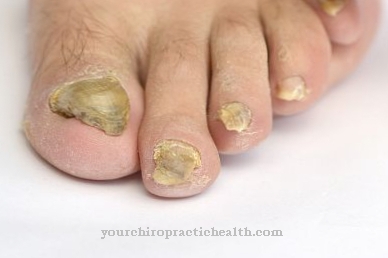Tendon pain are extremely uncomfortable for the affected patient and can lead to severely restricted mobility. Since a wide variety of causes must be considered as triggers, tendon pain should always be examined and clarified by a specialist.
What is tendon pain?

Tendon pain can occur both in certain parts of the body - i.e. locally limited - as well as distributed throughout the body. In many cases, tendon pain is caused by inflammation in the joint or the tendon itself, which explains the severe pain.
The tendons in heavily used joints such as the knee, elbow or shoulder are particularly often affected areas. Clarification with a specialist in orthopedics or rheumatology is absolutely advisable in the case of chronic tendon pain.
Tendon pain can be a side effect of serious illnesses. These include, for example, inflammatory rheumatic diseases or so-called soft tissue rheumatism, which also includes fibromyalgia syndrome. In many cases, however, a harmless explanation for the unpleasant tendon pain can be found.
causes
The causes of tendon pain can vary, depending on the underlying condition of the tendon pain. On the one hand, incorrect or overstressing of the respective tendon can be considered, on the other hand, one-sided stress on the body region can lead to severe tendon pain.
Often the tendon pain is due to inflammation of the tendon or joint. If a patient has to take medication such as certain antibiotics, tendon pain can also occur as a side effect of the medication. Even after pregnancy, many mothers complain of tendon or joint pain, which is mostly due to the changed hormone levels during breastfeeding.
However, serious diseases such as fibromyalgia syndrome can also be a cause of tendon pain. A medical evaluation is therefore essential to find out the cause of tendon pain and to initiate appropriate treatment.
Diseases with this symptom
- rheumatism
- arthritis
- Tendinitis
Diagnosis & course
To find out the cause of tendon pain, the orthopedist or rheumatologist will first take an X-ray of the affected area. In some cases, this picture shows lime-like deposits in the area of the tendons that are responsible for the tendon pain.
If an underlying rheumatic disease is suspected, a laboratory test of the blood can provide information about certain rheumatoid factors in the blood. In addition, the specialist can use other imaging procedures for tendon pain such as CT or MRI. If the specialist suspects that fibromyalgia is a possible cause, he can make the diagnosis based on various examinations and symptoms.
Tendon pain is considered a persistent disease and - depending on the underlying disease - often becomes chronic. This is why it is important to see a specialist in good time if you have tendon pain.
When should you go to the doctor?
In most cases, tendon pain is caused by excessive stress in certain areas of the body. If tendon pain occurs after such an activity, a doctor does not need to be consulted immediately. This pain usually subsides on its own within two to three days, so that medical or drug treatment is not required. In other cases, however, the tendon pain persists even after several days, so that an independent recovery is not possible.
Before a doctor is consulted at this point, the affected person can of course first take their own healing measures. In the case of muscle or tendon injuries, heat contributes to an effective improvement. A grain pillow or a hot water bottle on the affected area can definitely have an effect. If this measure does not improve, a visit is of course inevitable.
If the pain persists over a long period of time, then there is a very high probability that it is overstretched or even torn tendon. A quick and effective recovery can only be achieved through medical treatment or with the help of appropriate medication.
If the affected person refrains from such treatment, the clinical picture can of course worsen considerably. The following applies: tendon pain should be assessed by a doctor after three to four days at the latest.
Doctors & therapists in your area
Complications
If not properly treated, visual pain can cause serious illness. How severe and intense this deterioration is depends on where the affected patient has caught the pain. With adequate prevention, for example through fascia training, the tendons are sustainably strengthened.
You are then more resilient and not too susceptible to irritation when exercising. During prevention, patients should take care that the tendons are not overstretched. Then prevention can be just as harmful as overtraining. After an injury, the patient should only work on the fascia with a trained trainer.
Fascia training can relieve tendon pain by re-moisturizing the fascia. Strength athletes very often have to struggle with the fact that the fasciae are dried out by the very intense weight training. If the patient should want to do the fascia training and the rest of the prevention himself after an injury, make sure that no hard fascia rolls are bought. These can damage the vision even more and should be avoided in the beginning after an injury, as well as pain.
Treatment & Therapy
Tendon pain is treated based on the underlying cause. One way to relieve severe tendon pain is to inject local anesthetics into the roots of the affected tendon. If larger areas are affected, numbing the surrounding nerves can also help relieve tendon pain.
Of course, pain medication should always be used, although severe tendon pain may require the patient to use opioids to relieve pain. If the tendon pain is due to a rheumatic disease, it should be treated with the help of suitable anti-inflammatory drugs. In addition, an improvement can be achieved through physiotherapy applications or massages.
For example, ultrasound or electrotherapy and acupuncture are particularly successful. In severe cases, temporary immobilization of the joint is indicated to improve tendon pain. In general, tendon pain usually requires longer treatment in order to achieve lasting success. A combination of different treatment methods can also be helpful, especially for chronic tendon pain.
Outlook & forecast
In many cases, tendon pain can seriously affect the patient's life. It is often not possible to carry out certain work, activities and sporting activities, so that the patient's movement is also restricted. In these cases, the person concerned is directed to the help of other people or devices.
For short-term tendon pain, treatment with painkillers is possible. However, this should not be done over a long period of time as the pain relievers can damage the stomach. If the pain persists, it is also possible to carry out pain therapy. The further treatment takes place with massages and with heat. Treatments with the help of acupuncture or ultrasound therapy are also possible.
In most cases, tendon pain does not go away immediately and requires long-term treatment. It can take several months for the tendon pain to go away or for the first results to become apparent. In many cases it is advisable to combine several methods so that the symptoms subside more quickly.
However, it cannot be ruled out that the tendon pain will reappear later in life. Here the patient should not take on any heavy physical strain or at least warm up the muscles and tendons with stretching exercises.
prevention
To prevent tendon pain, it is advisable to warm up sufficiently before physical activity, for example before exercising. This minimizes the risk of overloading the tendons and tendon attachments. At the same time, patients should try to avoid monotonous movements, as these are also a risk factor for tendon pain.
You can do that yourself
A number of home remedies and measures can help with tendon pain. In the event of acute symptoms, physical activity or exercise should first be stopped. The symptoms can usually be alleviated by lifting the affected part of the body and cooling it. Then a pressure bandage will help reduce the swelling.
A warm bath with home remedies like apple cider vinegar or clove oil numbs the muscles and relieves pain. In the case of inflammatory tendon pain, garlic and applications with quark or yogurt promise an improvement in the symptoms. Tendon pain in the context of tendinitis can also be relieved by rest and cooling. In addition, packs with radish or moor balm as well as natural remedies with analgesic and anti-inflammatory properties are recommended. Cayenne pepper, bitter salt and various Schüßler salts have proven to be effective.
For tendon pain as a result of sore muscles, light massages with menthol or peppermint oil and sufficient rest are recommended. Arnica and marigold extracts, for example in the form of ointments or gels, help with strains. Tendon pain in rheumatic diseases or after an accident should first be discussed with your family doctor. A complaint diary in which the type and severity of pain are recorded. enables targeted treatment.





.jpg)







.jpg)

.jpg)
.jpg)











.jpg)